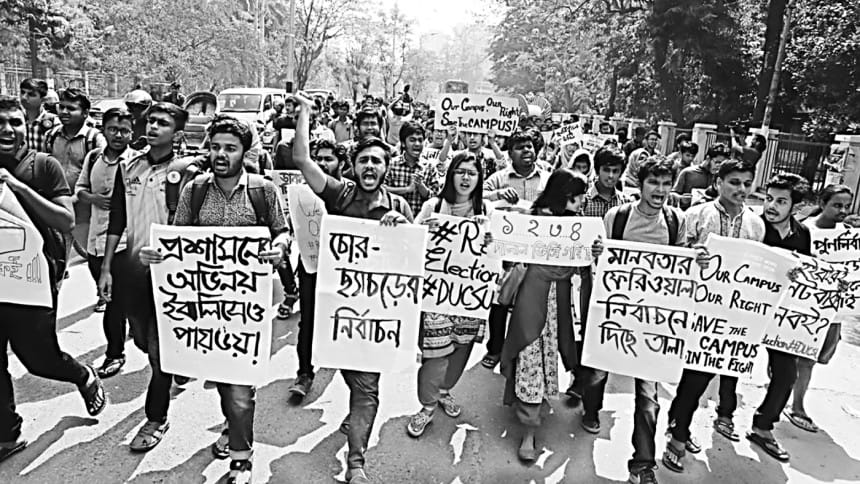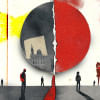Student politics in private universities: To be or not to be …

On September 2, the student front of a political party announced its intention to form committees in 16 private universities. It was greeted with apprehension and alarm. More than 10,000 guardians of students in these universities sent letters expressing their concerns, the administrators overwhelmingly opposed the move, and the Association of Private Universities in Bangladesh rejected the idea outright.
They have the legal right to make that choice based on sections 14.1 and 14.2 of the 2010 Act (which amended the Act of 1992 governing private universities) that implicitly provides them that authority. They also felt buoyed by the Education Minister Dr. Dipu Moni's wise decision to leave this matter to the Universities. Moreover, the evidence, logic and ethical foundations of their argument opposing this effort were sincere and compelling.
It should also be noted that most of the intellectual leaders resisting this proposal are richly credentialed and deeply dedicated educators. Many are personal friends held in much affection and respect. There is no doubt that their intentions are noble. But as many pundits, including Marx, have pointed out – the road to hell is paved with good intentions.
It is understandable that what passes in the guise of "student politics" in many public universities would naturally evoke anxieties among students, parents, teachers, administrators, trustees and stakeholders in many private universities who may be justifiably worried about similar pressures and practices being reproduced there.
The behavior of some student leaders in some public universities indicates that they are not exactly the paragons of personal virtue, intellectual nimbleness or social grace. There are allegations about being engaged in activities ranging from small-time extortion and seat allocation "business"; to humiliation and physical punishment of other students for supposed "inappropriate" behavior (e.g., not being sufficiently obsequious towards the leaders, or not joining a rally or meeting at their command); to facing more serious charges of torture, sexual predation and even murder. Some observers have wryly noted that they act like petty criminals, local mastaans and Mafia Dons rolled into one.
These leaders routinely "control" the residence halls, not only in terms of who can stay and where, but also some other operational aspects as well. Newspapers reported that, in this semester, when ordinary students demanded seats in the dormitories, they rallied in front of the living quarters of these leaders rather than the offices of the University authorities. They know where real power lies.
There is a general perception that the student leaders function in an ideological vacuum. There are no ideals or visions that motivate them at the national level e.g., challenging inequality, communalism, pollution, corruption, injustice, and so on. They are equally unconcerned about issues that affect them directly as students e.g., budgetary allocations for higher studies, library or research facilities in the Universities, the living conditions of the dorms, the safety and dignity of women students, or cultural life on campus. According to UGC figures (Annual Report, 2020) the total students enrolled in these universities are 9.02 lacs. These numbers are not inconsiderable, and these voices could have been consequential. But they are silent. Ironically, instead of supporting student movements aimed at achieving positive social change such as demands for No Vat on Education, No Quotas, or Safe Streets, they have attacked the protesters with extreme prejudice.
Their indifference to any policy or position is reflected not only in their violent engagements for personal benefits (e.g., attacking vendors in the New Market area causing widespread mayhem and two deaths), but also in the fact that they are as apt to fight or kill for intra-party dominance (6 deaths over the last 20 months) as in inter-party rivalry (3 deaths in the same period).
The "culture of impunity" within which they functioned has turned into a "culture of contempt" for the laws, the sanctity of educational institutions, or the norms and courtesies embedded in our social traditions. They are confident that their "bad behavior", or even first-degree criminal charges they face, would not lead to their exclusion from the highest committees on campus (TDS, September 7, 2022) or result in their expulsion from the Universities (unless one accidentally stepped on the wrong toes or unfortunately becomes a sacrificial lamb).

It is popularly held that "student politics" revolves around purely selfish and material considerations, intent on ensuring supremacy through threat, thuggery and thievery, and focused on building profitable networks for the future. In the sixties, the idea circulated that "the personal is the political" indicating that very personal decisions have political implications. In our public universities today, we see that "the political is the personal" where many of these student leaders cultivate patron-client relationships with party "bosses" by providing muscular and related services in exchange for current and future protections and financial prosperity. It is a Faustian bargain pursued in perversely hyper-masculine ways (though women student leaders are increasingly displaying their own brand of cruelty and control).
All this is well known and widely reported. The essay does not refer to any specific leader, faction, or party in describing this situation thus underscoring the conviction that it is not a problem created by any particular regime, though those who remain in power for longer periods of time naturally bear the heavier burden of the accusations.
The charges against "student politics" cannot be disputed. The solution currently adopted by the private universities is more questionable, for three reasons.
First, it is intellectually lazy. Simply to condemn the unsavory aspects of student politics in public universities and therefore disallow it at their institutions provides an answer without raising any questions. After all it was not always (indeed never) like this in the past. We all remember with pride and gratitude the incredible contributions of our student leaders in our march towards establishing our national identity, our struggles for equality and justice, and our war of independence. That tradition of public engagement continued till the early 1990s, but then collapsed. What happened? To duck that question is to avert their moral and scholarly responsibilities as educators.
Second, it is rhetorically a bit slippery and the sub-text may even carry a whiff of hypocrisy. If they are arguing that student politics is bad, it would require them to condemn all student politics and not merely at private institutions. However, most of them are not doing so. They are suggesting that students should be free to pursue politics, but not here. It is like claiming that racism is terrible, black and white people should study, work and interact together, but a black family cannot be allowed in my gated community. Or saying, we believe in worker's rights and collective bargaining, but no unions will be allowed here.

This suggests another awkward perspective. Is it possible that their decision is governed more by commercial considerations, rather than intellectual or administrative? After all, disturbances are generally bad for business, and student politics may have a disruptive impact in the campuses. This may affect enrollment (read profits) and, as shrewd businessmen, the university trustees want to protect their investments.
Furthermore, it exposes a class bias. It suggests that it may be acceptable to allow student politics in public universities but not in private ones, because the former is populated by the children of the hoi polloi (who can go to hell) , while the latter caters to the rich and powerful (who must be guarded and coddled). Apparently, what is sauce for the gander is not sauce for the goose.
When five of our most distinguished teachers (Drs. Anisuzzaman, Serajul Islam Chowdhury, Kabir Chowdhury, Zillur Rahman Siddiqui and Jamal Nazrul Islam) issued a statement prior to the formulation of the 2010 Act, they had explicitly suggested that the relationship between student bodies and political parties must be severed in all cases and everywhere. The clarity, consistency and the principled nature of that position is not reflected in the argument advanced by today's educators.
Third, it demonstrates a reductionist approach towards politics as a cynical and self-serving exercise, an amoral project where the means do not matter and the ends are driven by the lust for power as Machiavelli had suggested. It ignores its rich philosophical genealogy in its emphasis on public service, collective welfare and high ideals.
In Socratic terms politics was about establishing justice, in Aristotelian terms about instilling civic virtue, in Mill/Benthamite or Utilitarian terms about securing the greatest good for the highest number, in Marxian terms about pursuing distributional fairness, in Jeffersonian terms about protecting the inalienable rights of the people to life, liberty and the pursuit of happiness, in Hannah Arendtian terms it was about the celebration of human agency, individual autonomy and personal freedom.
It is entirely possible to enjoin the politics of the public good, not personal interest; the politics of establishing the rights of the people, not protecting the privileges of the few; the politics of the healthy competition of ideas among fellow citizens not a confrontation between enemies; the politics of encouraging the better angels of our nature, not pandering to the worst demons in our psyche.
We must remember that it is possible to have politics without democracy. But, it is absolutely impossible to have democracy without politics. The politics of anti-politics being prescribed and encouraged today by apparently well-meaning advocates not only disregards that fundamental reality, it ignores our own history and, more ominously, hints at darker times.
It is important to understand that student politics in our public universities did not sour suddenly, by default, or by accident. We must consider the political culture within which it is located - where the national elections are farcical, the parliament irrelevant, the judiciary overwhelmed, the rule of law throttled, and the country forced to endure a putrid environment of violence, corruption, rudeness, intolerance, and the shameless flaunting of naked power, as well as the vulgar display of conspicuous consumption, by the economic, bureaucratic and political elite.
We must also try to examine the education we are imparting to our students. What emphasis on society, history and the humanities are we putting in our schools, on culture and aesthetics, on critical thinking? What are we teaching them about personal responsibility, humility, social graces, caring for the environment, tolerance of "others", respecting the "public space" shared by all, shaping a "civic consciousness", or distinguishing right from wrong? What are they learning about democracy, constitutionalism, civil liberties, human rights, free speech, public accountability or the rule of law? Even in our institutions of higher education, how many of our private universities have regular departments or courses on the social sciences, history, arts and the humanities?
Academics must also honestly interrogate themselves about their own culpability in creating the enabling conditions for this situation to develop. While there are uplifting examples of individual brilliance, devotion and integrity, the image of university teachers remains tarnished by "scandals" - of teachers who allegedly plagiarize; assault, or even plot to kill, other colleagues; lock each other up in, or out, of their offices; pressure women students for sexual favors; disregard their teaching responsibilities in seeking temporary gigs elsewhere; undertake little or no research; undergo no professional developments; and engage in their own color-coded political gamesmanship for personal gain?
Similarly, there are reports of VCs who do not attend office, hire people on personal or partisan considerations (one issued more than 130 appointment letters on his last day in office), demonstrate environmental insensitivity in pursuing construction projects, arrange "pay-offs" for student leaders out of development funds, threaten legal action against critics, call student leaders for personal protection when they feel threatened (not the relevant law enforcement authorities), and face multiple investigations for procedural and ethical transgressions. Even private universities are not immune to some of these charges with issues of embezzlement and other problems surfacing lately.
It must also be remembered that no elections were held in our premier public university for 28 years, and when they was allowed, the elected VP was regularly threatened, beaten, or harassed in court. Similarly, do all private universities permit representative bodies elected by the students?
What examples, experiences, role models, or inspirations are we, the teachers and administrators, setting for our students to follow? Can we raise Lion Kings in a chicken farm?
At the same time, student leaders must also realize that the reasons why they are so unwelcome in the private universities is not because these institutions are opposed to their constitutional rights to express themselves and organize, but because of their reputation for alleged corruption, violence and their aggressive intolerance of any criticism or contrary views. Fear as an instrument of unilateral dominance and control is completely antithetical to the democratic spirit. These leaders cannot claim a democratic right while denying it to others.
So, rather than pointing fingers at each other, let us all accept responsibility for this terrible state of affairs affecting higher education and find credible, creative and collective ways to improve the situation. Given the importance of politics in the development of democratic values and institutions, let us not throw the baby out with the bathwater.
Perhaps, instead of being a threat, this may be an opportunity. Instead of shutting our doors in fear, we can open our hearts in hope. And instead of assuming that students and academics, or private and public universities, pursue divergent objectives, let us imagine a space where both education and democracy (my twin passions for long) may support each other to survive and flourish.
Footnote: A few paragraphs here are based on earlier writings.
Dr Ahrar Ahmad is Professor Emeritus at Black Hills State University in the US, and Director General of Gyantapas Abdur Razzaq Foundation in Dhaka. He can be contacted at [email protected]

 For all latest news, follow The Daily Star's Google News channel.
For all latest news, follow The Daily Star's Google News channel. 







Comments